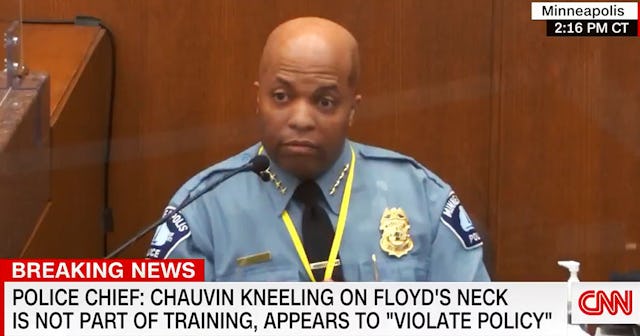Minneapolis Police Officials Say Derek Chauvin's Actions Were 'Not What We Train'

Multiple police officers testified Chauvin’s actions were not part of any police training
The criminal murder trial of Derek Chauvin is in its second week and the testimony continues to be heart-wrenching and horrifying to hear. This week, the training coordinator for the Minneapolis Police Department’s crisis intervention program testified about the use of proper force, backing up testimony from others in the department that what Chauvin did to George Floyd last May was not proper protocol.
“Policy requires that when it’s safe and feasible, we should de-escalate,” said Sgt. Ker Yang, a 24-year vet of the police department said under oath when asked about de-escalating a situation.
Officers are trained in a critical decision-making model to address people in crisis that calls on them Chauvin took a 40-hour course on crisis intervention training in 2016, where he was taught the proper techniques in deescalation.
A training officer testified that Chauvin wasn’t using proper protocol.
Inspector Katie Blackwell, who commands the Minneapolis Police Department’s 5th Precinct and used to run the department’s police training, said his technique of kneeling on Floyd’s neck while he was laying on the ground handcuffed was not taught in his training.
“Is this a trained technique … by the Minneapolis Police Department when you were overseeing the training?” prosecutor Steven Schleicher asked. After Blackwell stated it was not, she continued, saying, “Per policy, a neck restraint is compressing one or both sides of the neck, using an arm or a leg. But what we train is using one arm or two arms to do a neck restraint,” she said. “I don’t know what kind of improvised position that is. So that’s not what we train,” Blackwell said.
The police chief also said Chauvin’s actions were ‘not part of our values.’
Chief Medaria Arradondo, who also argued against Chauvin’s decision to kneel on Floyd’s neck, agreed it was not part of any training an officer would receive. “That in no way shape or form is anything that is by policy. It is not part of our training, and it is certainly not part of our ethics or our values,” Arradondo said.
Floyd was pronounced dead on May 25, 2020 after Chauvin kneeled on his neck for over nine minutes while onlookers watched in horror, some begging for Chauvin to stop. Many have testified during the trial, stating they feel guilt, anxiety, and remorse that they couldn’t do more to save Floyd’s life.
“That action is not de-escalation, and when we talk about the framework of our sanctity of life and when we talk about the principles and values we have, that action goes contrary to what we’re talking about,” Arradondo added.
This combined testimony is in direct contrast to the defense’s argument that Chauvin “did exactly what he had been trained to do” when he restrained Floyd.
Chauvin has pleaded not guilty to second-degree murder, third-degree murder, and third-degree manslaughter in Floyd’s death.